
The world’s first self-driving taxis have begun picking up passengers in Singapore.
Select members of the public can hail a free ride through their smartphones in taxis operated by nuTonomy, an autonomous vehicle software start-up.
While multiple companies, including Google and Volvo, have been testing self-driving cars on public roads for several years, nuTonomy says is the first to offer rides to the public.

Its launch in Singapore is beating ride-hailing service Uber, which plans to offer rides in autonomous cars in Pittsburgh in the US, by a few weeks.
NuTonomy is starting small – currently six cars, rising to a dozen by the end of the year.
The ultimate goal, company executives say, is to have a fully self-driving taxi fleet in Singapore by 2018, to help cut the number of cars on the city state’s congested roads. They are also working on testing similar taxi services in other Asian cities, the US and Europe.
For now, the taxis only run in a 2.5 square mile (6.5 square kilometre) business and residential district called “one-north”, and pick-ups and drop-offs are limited to specified locations.

The company says dozens have signed up for the launch, and it plans to expand that list to thousands of people within a few months.
The cars – modified Renault Zoe and Mitsubishi i-MiEV electrics – have a driver in front who is prepared to take back the wheel and a researcher in the back who watches the car’s computers.
Each car is fitted with six sets of Lidar – a detection system that uses lasers to operate like radar – including one which constantly spins on the roof. There are also two cameras on the dashboard to scan for obstacles and detect changes in traffic lights.
Doug Parker, nuTonomy’s chief operating officer, said autonomous taxis could ultimately reduce the number of cars on Singapore’s roads from 900,000 to 300,000.

“When you are able to take that many cars off the road, it creates a lot of possibilities. You can create smaller roads, you can create much smaller car parks,” he said. “I think it will change how people interact with the city going forward.”
Earlier this year, the company was the first to win approval from Singapore’s government to test self-driving cars in one-north.
Singapore is ideal because it has good weather, great infrastructure and drivers who tend to obey traffic rules, Iagnemma said. As a land-locked island, the city of 5.4 million people is seeking creative ways to grow its economy, so it has been supportive of autonomous vehicle research.
Olivia Seow, 25, who took a test ride, said she was nervous when she got into the car, and then surprised as she watched the steering wheel turn by itself.

“It felt like there was a ghost or something,” she said.
But she quickly relaxed. The ride was smooth and controlled, she said, and she was relieved to see that the car recognised even small obstacles like birds and motorcycles parked in the distance.
“I couldn’t see them with my human eye, but the car could, so I knew that I could trust the car,” said Seow.